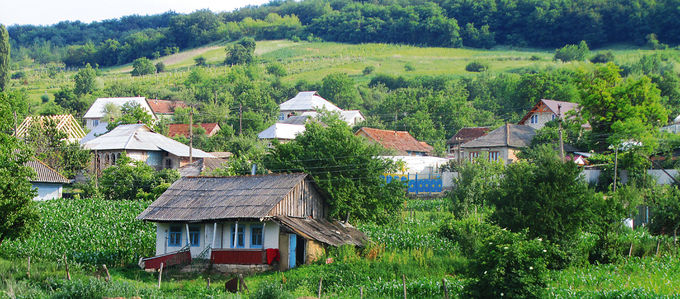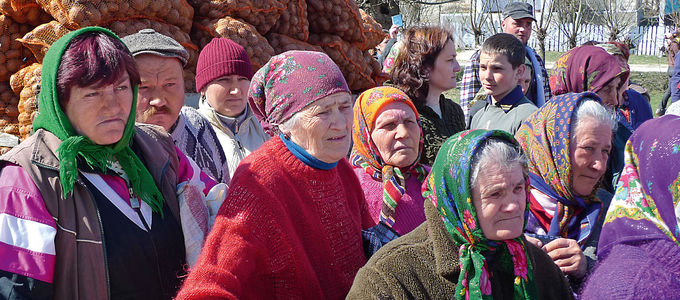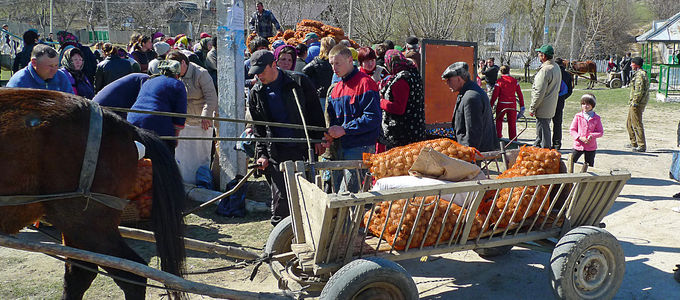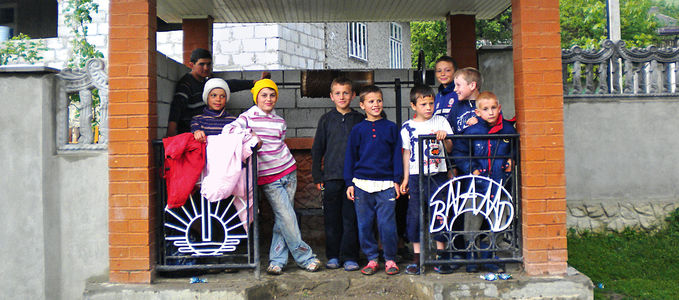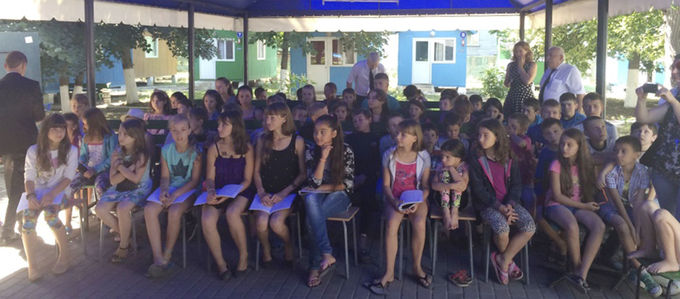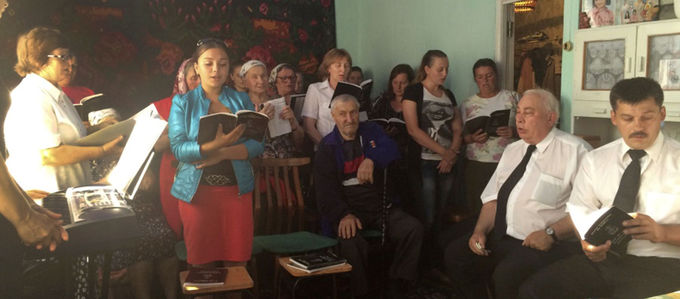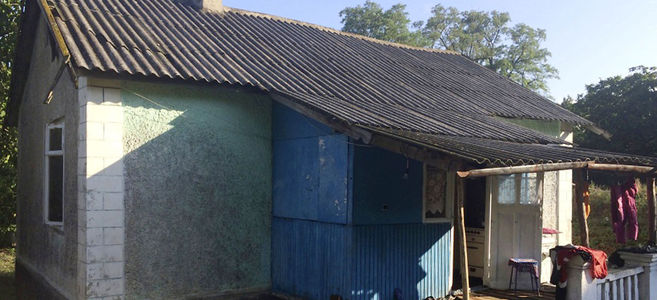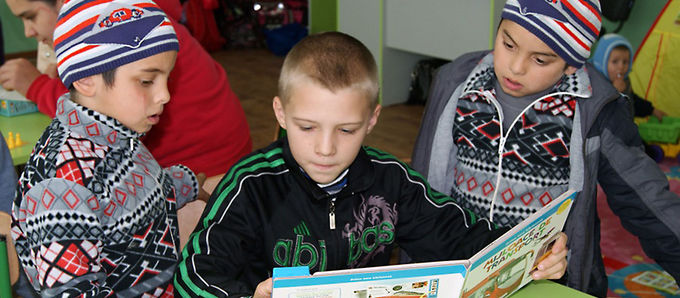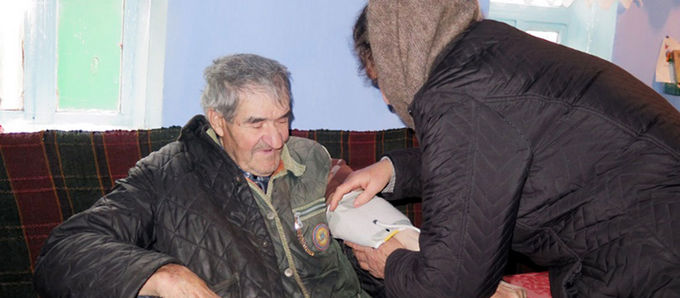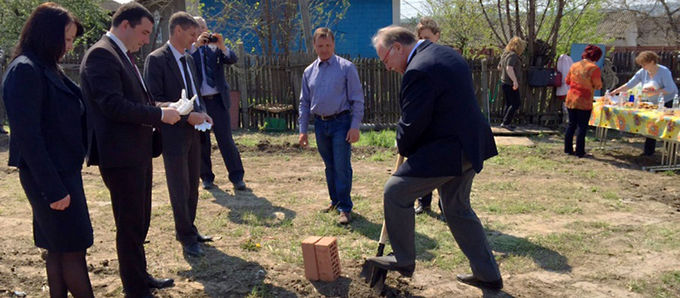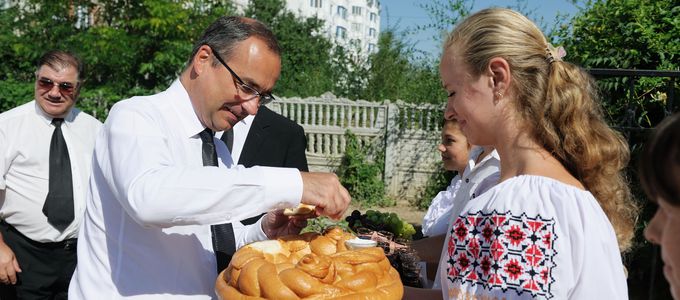“Faith in Jesus helps us cope with day-to-day concerns”
Bread is being distributed in church. No, not Holy Communion, real bread. It is the sheer poverty of the people that is making this necessary. And these scenes were experienced by New Apostolic Christians in Moldova, a country in the eastern part of Europe. The Chief Apostle will be visiting Moldova this weekend.
“Many kissed the bread and cried tears of joy,” Apostle Semion Cazacu wrote, following a humanitarian relief action that took place in the year 2004. Following the divine service that day, the New Apostolic Church had distributed bread in all of its congregations in the country.
And just about ten years on, the lives of the people still had not improved much. Rice, buckwheat, sugar, pasta, and cooking oil were distributed to people in the village of Leova in July 2013 by District Elder Kiril Popovici and Marina Luchian, an employee of the Church offices. The village is located about 100 kilometres south-west of Chisinau, the national capital.
Escape from poverty
“Life in Moldova is hard, also for our members,” District Apostle Markus Fehlbaum of Switzerland describes the situation in this part of his working area. With a per capita income of about 185 US dollars per month, the small country that is sandwiched between Romania and Ukraine is one of the poorest in Europe.
A third of the population lives below the poverty line. In their quest for work, many Moldovans leave home to work abroad and earn money. One million people of working age have already migrated. They send more money home than their fellow-countrymen are able to earn themselves at home.
The most vulnerable stay behind
Old people, children, and young people stay behind. Most live in villages which lack even the most basic of infrastructure. The few roads are pockmarked with potholes. Instead of cars, people use wooden carts to get around, which are pulled by an ox or a horse. The people live in very simple and often run-down houses—without a central water or gas supply.
The villagers try to help themselves by growing vegetables and corn, but when long droughts affect the region and result in miserable harvests, the people in the rural areas become desperate. How are they going to feed their children and themselves?
Not without consequences for the congregations
“The material concerns lead to existential fears. The people become depressed and lose all joy of life.” Apostle Cazacu wrote this in an article in the German magazine Unsere Familie in connection with a visit of the Chief Apostle to the country in 2013. He went on to say, “A visit by the Chief Apostle provides divine strength, and it will help us overcome our lethargy.”
And the brothers and sisters can certainly use all they can get. Because poverty obviously does not stop at the church door. Of the more than 100 New Apostolic ministers, only about half are available to look after the congregations. The other half has emigrated because of economic pressures. “We have congregations that consist of mothers, grandfathers, and children,” the Apostle says.
Optimistic outlook
“Despite the negative effects emigration is having on us, we will not allow it to discourage us but move on confidently. The brothers and sisters come together anyway and celebrate a prayer service. Our ministers will continue to drive around and visit the congregations and conduct several services on a weekend,” Apostle Cazacu says.
Where does he take his optimism from? Moldova receives quite a bit of support from brothers and sisters abroad. NAK-Humanitas, for example, the relief organization of the New Apostolic Church Switzerland, has been supporting projects in Moldova for many years. And their focus is no longer on distributing food; it has shifted. The organization has been promoting projects that help the people to help themselves.
NAK-Humanitas is concentrating its efforts on the poorest of the poor: children, the elderly, sick people, and ethnic minorities. It supports such projects as a day-care centre for vulnerable children, the establishment of a nursing service for seniors and education opportunities for Roma children. This is only a selection of the projects that the organization supports.
“We are grateful that this can be kept up thanks to the donations of many members in Austria and Switzerland,” Apostle Cazacu says. The most important thing for him, however, is: “Our faith in Jesus Christ gives us strength to cope with our day-to-day concerns.”
Background: Moldova
Moldova is situated in the eastern part of Europe, sandwiched between Romania and Ukraine. It emerged as an independent republic with the collapse of the Soviet Republic in 1991. The country’s population is about 3.5 million. The official language is Moldovan (it is virtually the same as the Romanian language), which is spoken by about two thirds of the population. Ukrainian, Russian, and Gagauz are also spoken in certain regions.
As for religious affiliation, about 95 per cent of the population belong to the Moldovan Orthodox Church or the Russian Orthodox Church. The New Apostolic Church has been active in Moldova since 1991. Since 1994 it has been officially recognized. Currently there are 43 congregations with a total of about 4,400 members. Apostle Semion Cazacu is responsible for the members.
Article info
Author:
Date:
Keywords:
Andreas Rother,
Dinara Ganzer
25.06.2016
Moldova,
journeys of Chief Apostle,
Aid agencies,
Social commitment,
Congregational life


